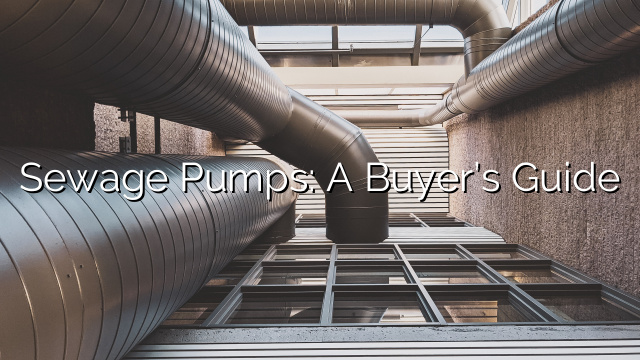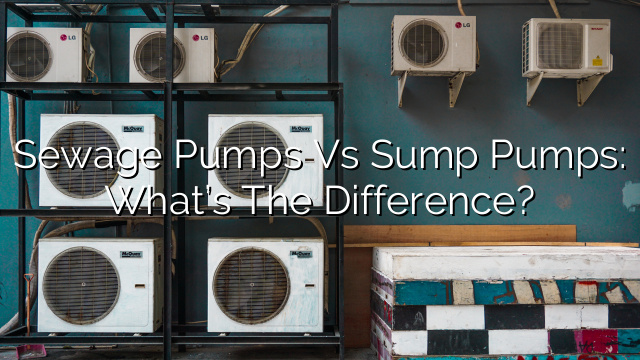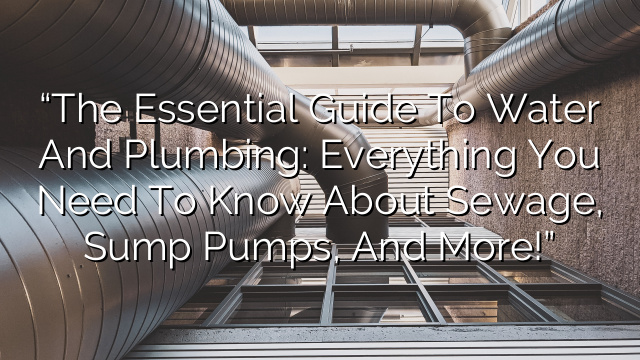The Importance of Sewage Pumps
If you have a home or business that is connected to a municipal sewer system, you have probably heard of sewage pumps. These pumps play a crucial role in transporting wastewater from your property to the main sewer line. Without them, you would be left with a mess of backed-up sewage and potential health hazards.
Choosing the Right Size Pump
When it comes to sewage pumps, size matters. You need to select a pump that is capable of handling the volume and pressure of wastewater that will be coming from your property. If the pump is too small, it may not be able to keep up with the demand, leading to frequent backups and overflows. On the other hand, if the pump is too large, it may end up running inefficiently and wearing out faster.
To find the right size pump for your needs, you will need to calculate the average daily flow rate of wastewater from your property. This can be done by measuring the flow from various sources, such as toilets, sinks, and showers. Additionally, you will need to take into account the amount of vertical lift required to pump the wastewater to the main sewer line. It is a good idea to consult with a professional to ensure that you select the correct pump size for your specific situation.
Types of Sewage Pumps
There are two main types of sewage pumps: submersible pumps and pedestal pumps.
Submersible Pumps
Submersible pumps are designed to be submerged in the wastewater, ensuring quiet and efficient operation. These pumps are typically installed in a basin or pit and are equipped with a float switch that activates the pump when the wastewater level rises to a certain point. Submersible pumps are a popular choice due to their ease of installation and minimal maintenance requirements.
Pedestal Pumps
Pedestal pumps, on the other hand, are mounted on top of a pedestal and are designed to sit outside the basin or pit. These pumps are more visible and accessible than submersible pumps, but they tend to be noisier and may require more maintenance. Pedestal pumps are a good option if you have a limited budget or if the pit or basin where the pump will be installed is too small to accommodate a submersible pump.
Key Features to Consider
When shopping for a sewage pump, there are several key features that you should consider:
- Construction: Look for a pump that is constructed from durable materials, such as cast iron or stainless steel. These materials are resistant to corrosion and can withstand the harsh conditions often found in sewage systems.
- Motor: Choose a pump with a powerful motor that is capable of handling the demands of your specific application. Additionally, look for a pump with thermal overload protection to prevent the motor from overheating.
- Float Switch: A float switch is an essential feature that will automatically activate the pump when the wastewater level rises, and deactivate it when the level drops. Look for a pump with a reliable and adjustable float switch.
- Backup System: Consider investing in a pump with an integrated backup system, such as a battery-powered pump or a water-powered backup pump. This will provide an additional layer of protection in case of power outages or pump failures.
- Noise Level: If noise is a concern, look for a pump with noise-reducing features, such as rubber mounts or a soundproofing cover. Additionally, submersible pumps tend to be quieter than pedestal pumps.
- Warranty: Lastly, be sure to check the warranty offered by the manufacturer. A longer warranty is a sign of a quality pump that is built to last.
Conclusion
Choosing the right sewage pump is essential for maintaining the proper functioning of your plumbing system and preventing backups and overflows. By considering factors such as pump size, type, and key features, you can ensure that you select the best pump for your needs. If you are unsure about the best pump for your specific situation, it is always a good idea to consult with a professional plumber who can offer expert advice and guidance.








